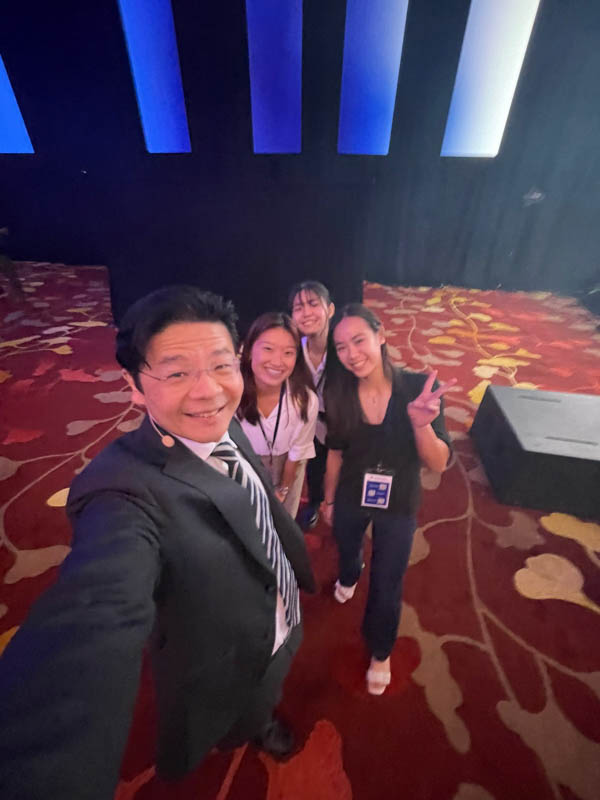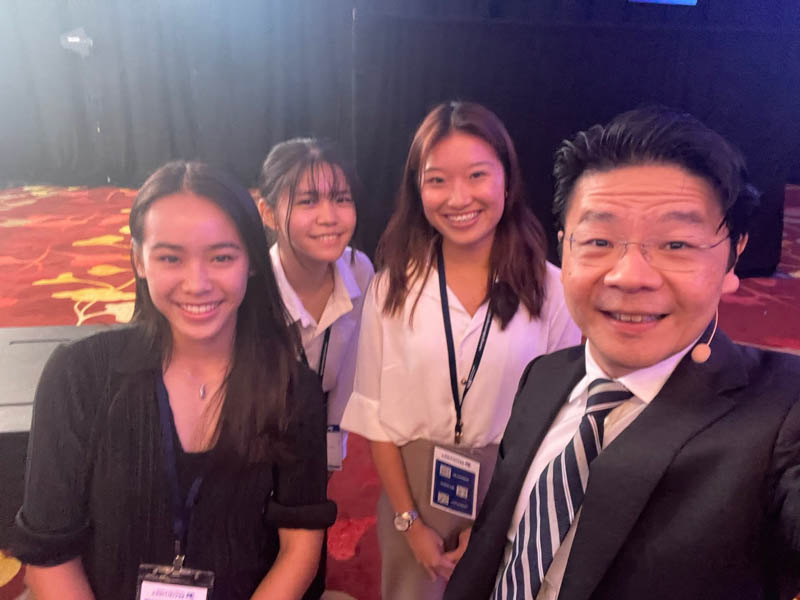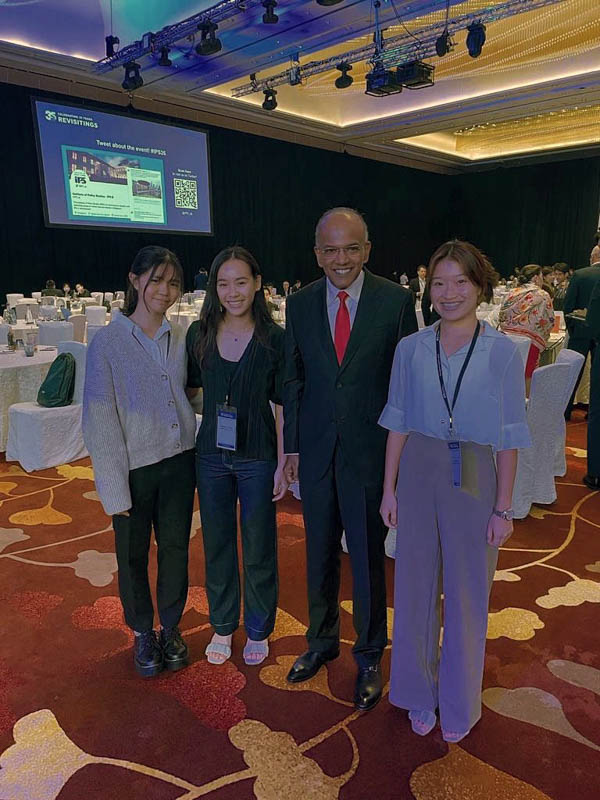- A
- A
- A
Revisiting Foundations At IPS Conference
Institute of Policy Studies (IPS) 35th Anniversary Conference

On 12 June 2023, student-athletes Samantha Theresa Ortega (IBDP, Year 6), Chloe Tan (Diploma in Business Studies, Year 3) from Track and Field Academy, and Ariana Beh Yoke Ching (IBDP, Year 6) from the Shooting Academy, attended the Institute of Policy (IPS) 35th Anniversary Conference, themed ’Revisitings’.
The purpose of the Conference was to re-examine some of the critical issues that Singapore will face, which includes Meritocracy, Housing, Pluralism, and Social Compact. The Conference featured prominent speakers such as Mr Lawrence Wong, Deputy Prime Minister and Minister for Finance; Mr K Shanmugam, Minister for Home Affairs and Minister for Law; Mr Chan Chun Sing, Minister for Education; and Ms Sim Ann, Senior Minister of State for Foreign Affairs and National Development, as well as prominent thought leaders.
Reflection by Samantha Theresa Ortega, Track and Field Academy, IBDP Year 6
Before attending the Institute of Policy Studies (IPS) 35th Conference, I was not only grateful but afraid of not being able to navigate through the important and profound conversations surrounding our Singapore society. However, in one of the first few opening speeches by our Minister of Education, Mr Chan Chun Sing, I began to realize that the Conference was not so much about “regurgitating yesterday’s problems with yesterday’s solutions'' as quoted by Mr Chan, but rather a conference laying out the government’s vision for Singapore going forward.
The Conference launched with a discussion surrounding meritocracy, a topic I found most relatable as a student experiencing Singapore’s current educational system and at an age where I am considering my career pathways. The dialogue on meritocracy enlightened me with the idea that meritocracy is a system that must be altered as Singapore progresses. As Singapore has uprooted itself from poverty since our independence, it is clear now that the goal of reducing inequality takes precedence over rapid success and the generation of wealth. The dialogue emphasizes how policies should aim to reduce the effect of inherited privileges that lead to perpetuating inequalities due to the typical meritocratic system we have today. For example, MOE is currently looking into partnering schools and encouraging alumni from different schools to exchange insights, uplifting schools that lack resources or experience. Moreover, the idea of redefining what “success” should mean to Singaporeans was echoed throughout the Conference.
The dialogues over various topics, such as societal compact and meritocracy, highlighted that an individual's success is not only the product of one’s hard work but also the hard work and sacrifice of the people who supported them. It is the vision that Singaporeans respect jobs regardless of their profiles, as they recognise that their efforts play a role in the success of the country. The culture also creates the mindset that individuals should share the benefits of their success with their community. With this vision in mind, IPS and the government hope policies can give greater recognition, respect, and wages to perceived “lower status” jobs. This widens the pathways to success where people can optimise their different talents in serving the community.
Overall, the Conference opened my eyes to what Singapore is striving for as a society, and I feel fairly optimistic that Singapore can move to reduce societal inequalities further.


Reflection by Chloe Tan, Track and Field Academy, Diploma in Business Studies, Year 3
Attending the IPS 35th Anniversary Conference was an eye-opening and enriching experience that left a deep impact on me. It was a privilege to be part of such an important event that celebrated the achievements and progress of Singapore, while also providing a platform for critical discussions on the nation's future.
I appreciated how the Conference started off with a video that emphasized the independence of IPS from the government. This key context of IPS being about ‘policy and not politics’ helped everyone understand that the discussions would not be one-sided or influenced solely by the government's viewpoint. It created an environment where different perspectives were welcomed, allowing for an inclusive dialogue throughout the event.
Throughout the Conference, I gained valuable insights into the different aspects of Singapore's development. The different speakers provided a deep understanding of the challenges and opportunities that lie ahead for our nation. A part that struck me most was when Minister Chan Chun Seng addressed a question about schools for differently-abled students, he repeatedly mentioned how Singapore’s education strives to “do justice to their blessings”. He also shared that the point of examinations is never to be based on the idea of sorting but the idea of sorting to help students learn best. When he talked about ‘value-adding’, it really piqued my thoughts. He gave a football analogy: “A good football team who uses their money to buy good players and win the team versus a normal football team who takes players and develops them well from scratch - which team has a more ‘value-add’?”
Other statements from the different speakers also triggered meaningful conversations between Samantha, Ariana and myself.
Another part that stood out to me was the strong spirit of Singaporeans and their unwavering commitment to building a better future. It was really inspiring to see how people from different walks of life, in the audience and on stage, actively engaged and participated in shaping Singapore's future. The collective drive toward the nation’s progress resonated strongly within me, and I felt a deep sense of pride in being a Singaporean.
Overall, the IPS 35th Anniversary Conference was a memorable and insightful experience. With this renewed sense of optimism and a commitment to actively contribute to the future of our nation, I believe we can continue to build on Singapore's remarkable achievements and forge a brighter path ahead together.


Reflection by Ariana Beh Yoke Ching, Shooting Academy, IBDP Year 6
Armed with a notepad and a (free!) pen from the venue, the three of us sat at a table near the stage and anxiously whispered to each other, “I don’t think I’m going to understand anything today.”
Two notepads and a three-course lunch later, I left the venue with valuable insights and a newfound interest in Singapore’s policy. Apart from the Ministers and Members of Parliament that were invited to speak, I found myself more interested in the panellists who were invited to give their private, professional insight on certain issues and policies that we were revisiting. These panellists brought with them a unique method of presenting their views and were not shy to criticise what needed to be criticised and subsequently revisited.
For example, on the panel on Pluralism, which featured Mr K. Shanmugam, there were two women, Ms Zuraidah Ibraihim, and Ms Corinna Lim. MS Zuraidah spoke about the importance of political pluralism, and Ms Corinna spoke about sexuality and gender pluralism. While my impression of “pluralism” has mostly been one about culture, religion, and race, the concept of political pluralism was a new perspective to me. Secondly, the idea of sexuality and gender pluralism was mentioned by the second speaker. While it may be an uncomfortable topic for many conservative listeners, it provided new insight into being an inclusive society.
My takeaways from these two topics are very different, but the lesson I learnt from both topics is that Singapore has done well. But to do better, we have to enact change, and, fittingly, revisit what needs to be revisited, to ensure that we are not a “plural” society just in name. Listening to varying perspectives with an open mind and even more open heart is the key to empathy, understanding, and consequently cohesion, and I am grateful that IPS did not shy away from bringing possibly controversial people to share their experiences, because I undoubtedly learnt a lot from the Conference enjoyed the conference a lot more than I thought I would.

On 12 June 2023, student-athletes Samantha Theresa Ortega (IBDP, Year 6), Chloe Tan (Diploma in Business Studies, Year 3) from Track and Field Academy, and Ariana Beh Yoke Ching (IBDP, Year 6) from the Shooting Academy, attended the Institute of Policy (IPS) 35th Anniversary Conference, themed ’Revisitings’.
The purpose of the Conference was to re-examine some of the critical issues that Singapore will face, which includes Meritocracy, Housing, Pluralism, and Social Compact. The Conference featured prominent speakers such as Mr Lawrence Wong, Deputy Prime Minister and Minister for Finance; Mr K Shanmugam, Minister for Home Affairs and Minister for Law; Mr Chan Chun Sing, Minister for Education; and Ms Sim Ann, Senior Minister of State for Foreign Affairs and National Development, as well as prominent thought leaders.
Reflection by Samantha Theresa Ortega, Track and Field Academy, IBDP Year 6
Before attending the Institute of Policy Studies (IPS) 35th Conference, I was not only grateful but afraid of not being able to navigate through the important and profound conversations surrounding our Singapore society. However, in one of the first few opening speeches by our Minister of Education, Mr Chan Chun Sing, I began to realize that the Conference was not so much about “regurgitating yesterday’s problems with yesterday’s solutions'' as quoted by Mr Chan, but rather a conference laying out the government’s vision for Singapore going forward.
The Conference launched with a discussion surrounding meritocracy, a topic I found most relatable as a student experiencing Singapore’s current educational system and at an age where I am considering my career pathways. The dialogue on meritocracy enlightened me with the idea that meritocracy is a system that must be altered as Singapore progresses. As Singapore has uprooted itself from poverty since our independence, it is clear now that the goal of reducing inequality takes precedence over rapid success and the generation of wealth. The dialogue emphasizes how policies should aim to reduce the effect of inherited privileges that lead to perpetuating inequalities due to the typical meritocratic system we have today. For example, MOE is currently looking into partnering schools and encouraging alumni from different schools to exchange insights, uplifting schools that lack resources or experience. Moreover, the idea of redefining what “success” should mean to Singaporeans was echoed throughout the Conference.
The dialogues over various topics, such as societal compact and meritocracy, highlighted that an individual's success is not only the product of one’s hard work but also the hard work and sacrifice of the people who supported them. It is the vision that Singaporeans respect jobs regardless of their profiles, as they recognise that their efforts play a role in the success of the country. The culture also creates the mindset that individuals should share the benefits of their success with their community. With this vision in mind, IPS and the government hope policies can give greater recognition, respect, and wages to perceived “lower status” jobs. This widens the pathways to success where people can optimise their different talents in serving the community.
Overall, the Conference opened my eyes to what Singapore is striving for as a society, and I feel fairly optimistic that Singapore can move to reduce societal inequalities further.


Reflection by Chloe Tan, Track and Field Academy, Diploma in Business Studies, Year 3
Attending the IPS 35th Anniversary Conference was an eye-opening and enriching experience that left a deep impact on me. It was a privilege to be part of such an important event that celebrated the achievements and progress of Singapore, while also providing a platform for critical discussions on the nation's future.
I appreciated how the Conference started off with a video that emphasized the independence of IPS from the government. This key context of IPS being about ‘policy and not politics’ helped everyone understand that the discussions would not be one-sided or influenced solely by the government's viewpoint. It created an environment where different perspectives were welcomed, allowing for an inclusive dialogue throughout the event.
Throughout the Conference, I gained valuable insights into the different aspects of Singapore's development. The different speakers provided a deep understanding of the challenges and opportunities that lie ahead for our nation. A part that struck me most was when Minister Chan Chun Seng addressed a question about schools for differently-abled students, he repeatedly mentioned how Singapore’s education strives to “do justice to their blessings”. He also shared that the point of examinations is never to be based on the idea of sorting but the idea of sorting to help students learn best. When he talked about ‘value-adding’, it really piqued my thoughts. He gave a football analogy: “A good football team who uses their money to buy good players and win the team versus a normal football team who takes players and develops them well from scratch - which team has a more ‘value-add’?”
Other statements from the different speakers also triggered meaningful conversations between Samantha, Ariana and myself.
Another part that stood out to me was the strong spirit of Singaporeans and their unwavering commitment to building a better future. It was really inspiring to see how people from different walks of life, in the audience and on stage, actively engaged and participated in shaping Singapore's future. The collective drive toward the nation’s progress resonated strongly within me, and I felt a deep sense of pride in being a Singaporean.
Overall, the IPS 35th Anniversary Conference was a memorable and insightful experience. With this renewed sense of optimism and a commitment to actively contribute to the future of our nation, I believe we can continue to build on Singapore's remarkable achievements and forge a brighter path ahead together.


Reflection by Ariana Beh Yoke Ching, Shooting Academy, IBDP Year 6
Armed with a notepad and a (free!) pen from the venue, the three of us sat at a table near the stage and anxiously whispered to each other, “I don’t think I’m going to understand anything today.”
Two notepads and a three-course lunch later, I left the venue with valuable insights and a newfound interest in Singapore’s policy. Apart from the Ministers and Members of Parliament that were invited to speak, I found myself more interested in the panellists who were invited to give their private, professional insight on certain issues and policies that we were revisiting. These panellists brought with them a unique method of presenting their views and were not shy to criticise what needed to be criticised and subsequently revisited.
For example, on the panel on Pluralism, which featured Mr K. Shanmugam, there were two women, Ms Zuraidah Ibraihim, and Ms Corinna Lim. MS Zuraidah spoke about the importance of political pluralism, and Ms Corinna spoke about sexuality and gender pluralism. While my impression of “pluralism” has mostly been one about culture, religion, and race, the concept of political pluralism was a new perspective to me. Secondly, the idea of sexuality and gender pluralism was mentioned by the second speaker. While it may be an uncomfortable topic for many conservative listeners, it provided new insight into being an inclusive society.
My takeaways from these two topics are very different, but the lesson I learnt from both topics is that Singapore has done well. But to do better, we have to enact change, and, fittingly, revisit what needs to be revisited, to ensure that we are not a “plural” society just in name. Listening to varying perspectives with an open mind and even more open heart is the key to empathy, understanding, and consequently cohesion, and I am grateful that IPS did not shy away from bringing possibly controversial people to share their experiences, because I undoubtedly learnt a lot from the Conference enjoyed the conference a lot more than I thought I would.

